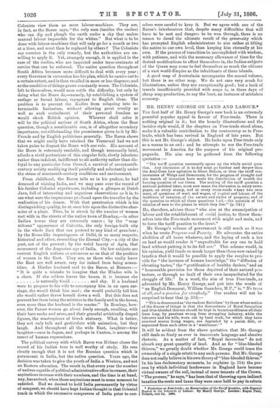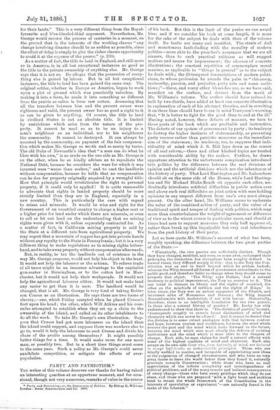powerful popular appeal in favour of Free-trade. There is nothing
original in it ; but the homely illustrations and the incisive style would, if the chapters on Free-trade stood alone, make it a valuable contribution to the controversy as to Free- trade, which has been revived in England of late years. But this is not Mr. George's object. He looks upon Free-trade only as a means to an end ; and he attempts to use the Free-trade movement in America for the purpose of his original pro- paganda. His aim may be gathered from the following quotation :—
"The tarlf question necessarily opens up the whole social ques- tion. Any discussion of it to-day must go further and deeper than the Anti-Corn Law agitation in Great Britain, or than the tariff con- troversies of Whigs and Democrats, for the progress of thought and the march of invention have made the distribution of wealth the burning question of our times. The making of the tariff question a national political issue, must now mean the discussion in every news- paper, on every stump, and at every cross roads uhere two men meet, of questions of work and wages, of capital and labour, of the incidence of taxation, of the nature and rights of property, and of the question to which all these questions It ad,—the question of the relation of men to the planet in which they live." (p. 341)
He, therefore, advises those "who aim at the emancipation of labour and the establishment of social justice, to throw them- selves into the Free-trade movement with might and main, and to force the tariff question to the front."
Mr. George's scheme of government is still much as it was when he wrote Progress and Poverty. He advocates the entire abolition of all taxes whatever, and the laying of such a tax on land as would render it "unprofitable for any one to hold land without putting it to its full use." This scheme would, in his opinion, yield funds so much larger than those now raised by taxation that it would be possible to apply the surplus to pro- vide for "the increase of human knowledge," the "diffusion of elevating tastes," the "gratification of healthy desires," and an "honourable provision for those deprived of their natural pro- tectors, or through no fault of their own incapacitated for the struggle of life." In a word, the aim of true Free-trade, as advocated by Mr. Henry George, and put into the words of "an English Democrat, William Saunders, M.P.," is, "No taxes at all, and a pension for eVeryllody." Our readers will not be surprised to hear that (p. 334)—
" This is denounced as the rankest Socialism' by those whose notion of the fitness of things is that the descendants of Royal favourites and blue-blooded thieves should be kept in luxurious idleness all their lives long, by pensions wrung from struggling industry, while the labourer and his wife, worn out by bard work, for which they have received scarce living wages, are degraded by a parish dole, or separated from each other in a 'workhouse.'"
It will be evident from the above quotation that Mr. George still deals as freely as ever in inaccurate language and abusive rhetoric. As a matter of fact, "Royal favourites" do not absorb any great quantity of land. And as for "blue-blooded thieves," we greatly doubt whether Mr. George could trace the ownership of a single estate to any such persons. But Mr. George does not really believe in his own theory of "blue-blooded thieves."
In his less declamatory moments, he explains (p. 314) the pro- cess by which individual landowners in England have become
virtual owners of the soil, instead of mere tenants of the Crown. "The process," he says, " has been that of throwing upon indirect taxation the rents and taxes they were once held to pay in return • Protection or iris-trade:. an Examination of the Ter,ff Question, with Especial Regard to the interots of Labour. By Henry George. London : Kagan Pan], Trench, and Co. 1886.
for their lands." This is a very different thing from the Royal- favourite and blue-blooded-thief argument. Nevertheless, Mr. George would reverse the process of centuries in a moment, on the ground that in the interests of the working classes "any change involving disaster should be as sudden as possible, since the effect of delay is simply to give the richer classes opportunity to avoid it at the expense of the poorer." (p. 233).
As a matter of fact, the title to land in England, and still more so in America, is in all but exceptional instances as good as the title to the private ownership of anything else. Mr. George says that it is not so. He alleges that the possession of every- thing else is gained by labour. But in all but exceptional instances, the title to land has been gained the same way. The original settler, whether in Europe or America, began to work upon a plot of ground which was practically valueless. By snaking it into a farm, he made it into something as different from the prairie as calico is from raw cotton. Assuming that all the transfers between him and the present owner were righteous and valid, the present owner has as good a right to it as can be given to anything. Of course, the title to land in civilised States is not an absolute title. It is limited by restrictions which arise from the nature of the pro- perty. It cannot be used so as to be an injury to a man's neighbour as an individual, nor to his neighbours the community. It cannot be destroyed. It can always be assumed by the community, on payment of the fair compensa- tion which makes Mr. George so wroth and so merry by turns. The old Duke of Newcastle's idea that "a man can do what he likes with his own," is as crude on the one side as Mr. George is on the other, when he so kindly advises us to repudiate the National Debt, because he considers the wars for which it was incurred were "worse than useless," and to oust the landlords without compensation, because be holds that no compensation can be due for property originally acquired by a wrongful title. How that principle would revolutionise the right to personal property, if it could ouly be applied ! It is quite reasonable to advocate that rights in landed property should be more strictly limited than they are in England, especially in a new country. This is particularly the case with regard to mines and minerals. It would be wise and right for the Government of an unsettled country to charge a higher rent or a higher price for land under which there are minerals, or even to sell or let out land on the understanding that no mining rights were given with it, unless separately contracted for. As a matter of fact, in California mining property is sold by the State at a different rate from agricultural property. We may regret that a mountain of copper has got into private hands without any royalty to the State in Pennsylvania ; but it is a very different thing to make regulations as to mining rights before- hand, and to take away property without compensation-afterwards.
But, in reality, to tax the landlords out of existence in the way Mr. George proposes, would not help his object in the least. It would not help the labourer or the artisan. To relieve trade of all taxes might be an immense advantage to the capitalist gun-maker id Birmingham, or to the cotton lord in Man- chester, but it would not help their workpeople. It would not help the agricultural labourer either. It would not make land any easier to get than it is now. The landlord would be changed, that is all. Mr. George is very fond of taking Robin- son Crusoe as an illustration. He says there are two forms of slavery,—one, which Friday accepted when he placed Crusoe's foot upon his head ; the other, which Will Atkins and his com- rades attempted to establish when they set up a claim to the ownership of the island, and called on its other inhabitants to do all the work. To take Mr. George's own illustration. Sup- pose that Crusoe had got more labourers on the island than the island could support, and suppose there was nowhere else to go to, would it help the labourers to oust Crusoe and divide his share of the profits among themselves ? It might possibly better things for a time. It would make room for one more man, or possibly two. But in a short time things must come to the same pass. Such a policy as Mr. George's could never annihilate competition, or mitigate the effects of over- population.



































 Previous page
Previous page